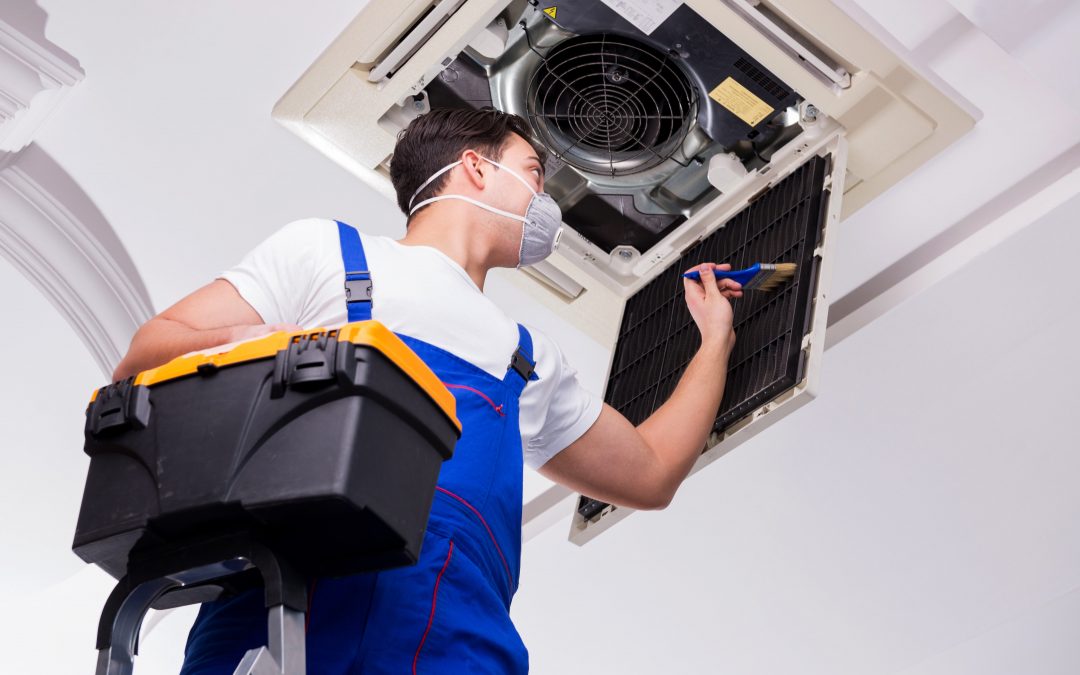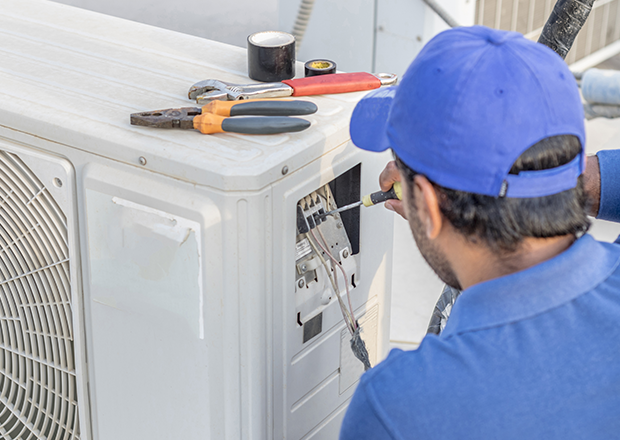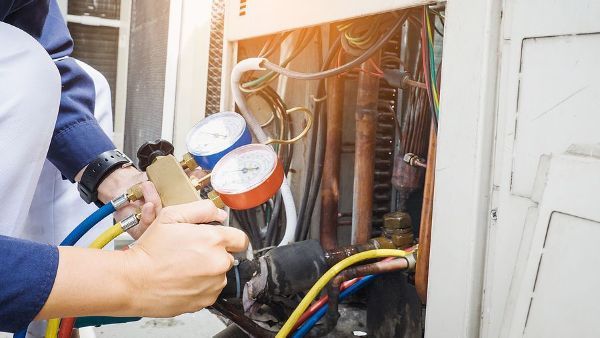Everything about HVAC: Identifying Common Issues and Effective A/c Repair Work Approaches
Cooling and heating systems are critical for maintaining interior convenience. Recognizing their elements and capability is crucial for recognizing typical problems. Home owners frequently deal with troubles such as inefficient cooling, strange smells, or climbing energy prices. These indications can show underlying concerns that may require focus. Checking out do it yourself troubleshooting methods can be valuable, but recognizing when to look for specialist help is just as crucial. What steps can be taken to assure resilient performance?
Recognizing Your A/c System: Components and Functionality
A HVAC system, commonly thought about the foundation of indoor environment control, includes numerous key parts that work with each other to regulate temperature level and air quality. The key elements consist of the home heating unit, air flow system, and a/c system. The heating device, usually a heating system or boiler, produces warmth throughout chillier months, while the cooling unit cools down interior areas during the summer season.

Usual Heating And Cooling Problems House Owners Encounter
Home owners typically deal with several common heating and cooling troubles, consisting of irregular temperature level distribution throughout their home. In addition, unusual noises throughout procedure can indicate underlying concerns that call for interest. Addressing these concerns promptly is important for keeping ideal system performance.
Irregular Temperature Distribution
Numerous families experience the aggravating concern of inconsistent temperature circulation, where certain rooms feel annoyingly warm while others continue to be also cold. This issue often develops from a selection of factors, including inadequate insulation, obstructed vents, or an improperly sized a/c system. When ducts are not appropriately sealed or when furniture obstructs air movement, some areas might receive insufficient cooling. Furthermore, thermostat positioning can greatly influence temperature guideline; a thermostat located in a sunlit area may misrepresent the total temperature level of the residence. Normal maintenance, including cleaning filters and guaranteeing ductwork is clear, can assist minimize these disparities. Home owners might likewise take into consideration zoning systems to better control temperatures throughout different locations of the home, advertising an extra comfy living setting.
Uncommon Sounds Throughout Operation
When a cooling and heating system runs, uncommon noises can show underlying concerns that need interest. Property owners may experience a series of sounds, such as grinding, squealing, or hissing. Grinding sounds commonly signify worn-out bearings or components, while squeaking can recommend loose belts or parts requiring lubrication. Hissing might indicate a cooling agent leak, which can compromise the system's performance. Additionally, banging noises might direct to loose ductwork or a problem with the blower follower. Each of these sounds works as a caution, motivating home owners to check out even more. Ignoring these indicators can bring about even more significant troubles and expensive repair work. Normal maintenance and punctual interest to unusual sounds can improve system longevity and efficiency, guaranteeing a comfy living atmosphere.
Signs That Indicate Your Air Conditioner Demands Repair Service
Exactly how can one inform if their a/c device is in requirement of repair? Several indications may show underlying issues requiring professional interest. If the A/c falls short to cool the room effectively, it might suggest a refrigerant leakage or compressor breakdown. Furthermore, an increase in energy costs without matching usage modifications might signal inadequacy in the system. House owners need to also be sharp to uncommon smells originating from the device, which can indicate mold growth or electric issues. If the AC regularly cycles on and off, it might be a sign of a defective thermostat or other mechanical issues. Lastly, the visibility of water merging around the device can show a blocked drain line. Recognizing these signs early can save time and cash, ensuring that the air conditioning system operates efficiently and efficiently.
DIY Troubleshooting Techniques for A/c Issues
When air conditioning repair technician dealing with a/c problems, house owners can utilize a number of DIY troubleshooting strategies to identify the trouble. Trick techniques consist of inspecting thermostat settings, inspecting air filters, and reviewing water drainage problems. These steps can help determine typical malfunctions prior to looking for expert support.
Checking Thermostat Settings
What steps should property owners require to assure their thermostat settings are appropriate? First, they must validate the thermostat is readied to the desired temperature level and setting, whether heating or air conditioning. Inspecting for a clear display and validating the thermostat is not set to "hold" or "trip" setting is essential. Homeowners must also validate that the thermostat is level and mounted in a place devoid of drafts, straight sunshine, or other temperature affects. Furthermore, rectifying the thermostat can help provide precise analyses. If the thermostat runs on batteries, changing them might deal with any issues. By systematically evaluating these elements, home owners can commonly identify and correct thermostat-related troubles, promoting optimal cooling and heating system performance.
Inspecting Air Filters
Air filters play a crucial role in maintaining excellent HVAC efficiency. They trap dirt, allergens, and various other fragments, ensuring clean air blood circulation. Over time, filters can end up being clogged up, reducing air movement and efficiency. To examine air filters, people need to initially locate the filter, commonly located in the return duct or near the heater. Once situated, they need to review the filter's problem-- if it shows up unclean or discolored, it likely needs replacement. Most filters require transforming every 1-3 months, depending on usage and ecological factors. Normal inspection and timely substitute of air filters not just boost air top quality however likewise extend the life-span of HVAC systems, preventing potential malfunctions and pricey fixings.
Reviewing Drainage Issues
Exactly how can house owners successfully determine and deal with drainage issues within their cooling and heating systems? Initially, they must check the condensate drain line for clogs or obstructions, which can result in water accumulation. Homeowners might utilize a wet/dry vacuum to remove any particles blocking the line. Next, checking the drainpipe frying pan for rust or leaks is vital, as a damaged pan can cause water to overflow. Routine cleaning of the drainpipe line with a mix of vinegar and water helps avoid future clogs. In addition, making certain appropriate incline of the drainpipe line promotes effective water circulation. If these do it yourself techniques do not fix the issue, getting in read this article touch with a specialist HVAC professional might be essential to avoid potential water damages and system failing.
When to Call a Specialist for A/c Repair Services

While some air conditioning concerns can be taken care of via do it yourself approaches, there are circumstances where calling an expert becomes vital. House owners must seek expert help when they come across consistent problems, such as inadequate air conditioning, strange noises, or uncommon smells emanating from the system. These symptoms may indicate much deeper issues that call for specialized understanding and tools to detect and repair appropriately.

Preventative Upkeep Tips for HVAC Durability
Regular preventative maintenance can substantially boost the long life of HVAC systems. Homeowners ought to arrange annual evaluations by licensed specialists to examine system performance and recognize possible problems. Regularly changing or cleansing air filters is essential, as this warranties correct air movement and reduces strain on the system. Additionally, inspecting and sealing ductwork stops power loss and boosts total efficiency.
It is additionally a good idea to maintain the exterior system free from particles and greenery, allowing for peak airflow and heat exchange. Home owners must inspect the condensate drainpipe for clogs to stay clear of water damages and mold and mildew growth. Moreover, maintaining proper thermostat settings and making use of programmable options can improve power performance. Finally, recording upkeep tasks helps track service history and can aid in determining reoccuring issues (AC repairman). By complying with these preventative actions, individuals can take full advantage of the efficiency and life-span of their a/c systems
Frequently Asked Inquiries
Exactly how Typically Should I Replace My Cooling And Heating System Filters?
Heating and cooling system filters should commonly be replaced each to three months, relying on usage, filter kind, and environmental variables. Regular substitute helps keep efficiency and air top quality, ensuring peak system efficiency throughout the year.
What Size A/c System Do I Required for My Home?
To establish the appropriate a/c system dimension for a home, one must consider square video footage, insulation high quality, and neighborhood environment. Consulting a specialist can help guarantee maximum effectiveness and comfort for the certain living room.
Exist Eco-Friendly Cooling And Heating Options Available?
Yes, environmentally friendly heating and cooling choices are offered, consisting of energy-efficient warmth pumps, solar-powered systems, and geothermal home heating. These options decrease power intake and environmental influence, promoting sustainability while preserving reliable climate control for household and industrial areas.
How Can I Improve My cooling and heating System's Power Performance?
To improve heating and cooling power effectiveness, one can routinely keep the system, seal air leaks, install programmable thermostats, utilize energy-efficient filters, and warranty appropriate insulation throughout the home to decrease power consumption and boost performance.

What Is the Ordinary Life-span of an A/c System?
The ordinary life-span of a cooling and heating system usually ranges from 15 to 25 years, depending upon aspects such as upkeep, usage, and the high quality of setup. Routine upkeep can significantly expand its functional long life.
Verdict
In recap, a complete understanding of cooling and heating systems encourages house owners to determine typical problems and address small troubles effectively. Recognizing indicators of malfunction, employing DIY fixing methods, and focusing on routine upkeep can boost system efficiency and efficiency. However, when faced with complex fixings, enlisting expert help is crucial to guarantee safety and longevity. By promoting awareness and proactive care, people can delight in a comfy indoor atmosphere while minimizing unexpected costs related to HVAC failings.